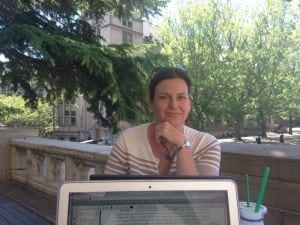IT’S NOT OFTEN A PROMINENT RESEARCHER FROM SERBIA comes to UW Pharmacy as a Fulbright Visiting Scholar. Dr. Jelena Parojcic is an associate professor in the Department of Pharmaceutical Technology at the University of Belgrade In Serbia. Her areas of research include Biopharmaceutical aspects of Drug Delivery; Drug Release Mechanisms In Vitro and In Vivo; and Bioperformance Dissolution Testing. She has a great interest in professional development of pharmacy faculty and the modernization of pharmacy curriculum and experiential education. We sat down with Dr. Parojcic to learn more about her six months here.
SG: How did you choose the UW School of Pharmacy?
JP: I came to Seattle four years ago and was deeply impressed by the city, especially the University of Washington campus and library. The Fulbright selection committee discourages scholars from choosing the most competitive schools, to improve their chances. I knew I wanted to be at UW School of Pharmacy as it has the best experiential education curriculum. Even though it was competitive, I approached colleagues here at UW with a project proposal and applied for and got the Fulbright Visiting Scholar grant, working with the Office of Pharmacy Professional Education.

“I knew I wanted to be at UW School of Pharmacy as it has the best experiential education curriculum. Even though it was competitive, I approached colleagues here at UW with a project proposal and applied for and got the Fulbright Visiting Scholar grant, working with the School’s Office of Pharmacy Professional Education (OPPE). ”
–Jelena Parojcic, UW School of Pharmacy Fulbright Visiting Scholar
SG: What did you research here?
JP: I am part of a European Union (EU) project aimed at the modernization of pharmacy education in Serbia. We are expanding and improving the experiential education curriculum. The US has an established system for experiential pharmacy education; and Europe is still struggling to find a model.
DS: Besides the great weather, why did you come out in the spring and summer?
JP: I wanted to attend the American Association of the Colleges of Pharmacy (AACP) conference in late July to network with colleagues from all over the United States. The conference was very useful for my project. Unlike the EU version which does not have decision-making authority, the conversations that occur at AACP become recommendations and then guidelines for schools of pharmacy. There are new accreditation standards and I look forward to seeing in December how the process I observed influenced the outcome. Smaller countries, like Serbia, are trying to figure out whether to adopt national standards for pharmacy education or collaborate with other EU countries and create regional standards. It’s an area that needs more research.
SG: What was the academic highlight for you?
JP: I was very interested in faculty development and was able to meet with colleagues in the Department of Pharmacy to learn more. I’ve attended the Teaching Certificate Program in Pharmacy Education and was able to experience active learning first hand. To me, this is a way to transform our teaching – involving the students in their own learning more than through traditional lectures. When I return to Belgrade, I will work with my colleagues to introduce this approach to our courses. I will also work to establish the Teaching in Pharmacy Education program for faculty and preceptors at the University of Belgrade and look forward to continuing my collaboration with colleagues from UW School of Pharmacy on the development and delivery of the relevant curricula.
SG: How do you think the students will respond to a different approach to teaching?
JP: I think it will be difficult at first, but in the long run, I think they will see the benefits of this approach. I plan to share these techniques with my colleagues too, so they can incorporate them into their classrooms. The connections I made here are so important to me and I would like to continue and extend this collaboration between Southeastern Europe and the Pacific Northwest.
SG: What surprised you about your time here in Seattle?
JP: Seattle is such an exciting place with state of the art technology – one student wore Google glasses. My apartment building had a drone flying outside its windows a few weeks ago and it was all over the news. I was fascinated with all the different scientific research stories on UW Today email. Seattle is a beautiful, international city – Seattleites are very modest about how wonderful it is!
Sarah Guthrie (SG) is the Director of Communications for the UW School of Pharmacy and can be reached at gu3@uw.edu.